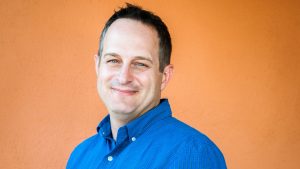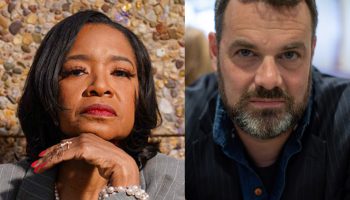
On Sunday in the Hall of Philosophy, Dustin Parsons apologized to ghosts.
The fourth section of Parsons’ fragmented, nonfiction essay “The Domestic Apologies,” “Apology to the Ghosts” addresses “that cold spot in the living room” at the center of a house haunted by spirits. Later in the piece, Parsons queries leftovers and writes of a couch flecked with his wife’s hair.
After making “many” visits to Chautauqua Institution from their former home in Fredonia, New York, Parsons and his wife Aimee Nezhukumatathil returned to the Institution for their week-long residencies as a prose writer and poet, respectively.
With his own work — including “The Domestic Apologies” essay and his first book, Exploded View: Essays of Fatherhood, with Diagrams — available as models, Parsons led participants through the art of brief nonfiction in his workshop this week, “Your Life in Miniature: Short Memoir.” He will give his Brown Bag lecture, “Ecstatic Ekphrastic: How Images and Text Can Work together in Writing,” on the advantages and nuances of a fresh style of experimental writing at 12:15 p.m. Friday, August 2 on the porch of the Literary Arts Center at Alumni Hall.
Parsons describes Exploded View as “a product of this kind of experiment.” Enlivened with visual depictions of schematics, directions and designs that accent the author’s words, the essay collection illuminates the seemingly mundane mechanics of being a son and father. In “Take an Island, Give an Island Back,” he recounts moments spent in Hundred Islands National Park, with then-pregnant Nezhukumatathil and her mother, via a map of the island clusters. In “Pumpjack,” he reflects on the lives of the men who operate the machines that force crude oil to the surface.
It was through fatherhood — he and Nezhukumatathil have two young boys together — that Parsons discovered the beauty of short-form creative nonfiction.
“I had these short bursts of time to write, and parenthood lends itself to small but meaningful moments that can be fully fleshed out in a micro-essay,” he said. “I found myself writing these moments out longhand again, in the waiting room of the dentist, at my son’s tennis practice. I was learning the importance of the fine tip of language that all writing depends upon.”
Although innovative forms are a guiding principle of his most recent work, he does not prioritize a concrete link between form and memory.
“That isn’t to say that when a memory is hazy I don’t equivocate in my work, or when a memory is lengthy I don’t take on the long form,” he said.
He counts three “lyric” and “heartbreaking” works — Sleep in Me by John Pineda, A Bestiary by Lily Hoang and Heart Berries: A Memoir by Terese Marie Mailhot — as a few of his favorite memoirs, and describes All You Can Ever Know as “wonderful.” Kiese Laymon’s 2019 Chautauqua Prize finalist Heavy: An American Memoir is, for Parsons, “an unflinching look at how we love ourselves and forgive ourselves and those around us,” and “a beautiful book of growing up.”
All of these memoirs are vulnerable and inventive, but unlike Parsons’ Exploded View, none of them contain a diagram of a pumpjack.
“What I can say is that sometimes a form can jog a memory,” Parsons said. “Sometimes, looking at a picture, a diagram, some sort of utilitarian form, can suggest an event from my life that I might not, until that moment, thought was worthy of an essay. Sometimes the lyrical form suggests tangents and digressions. Sometimes the uncertainty of the memory suggests the need for the lyrical. It happens different ways every time.”




